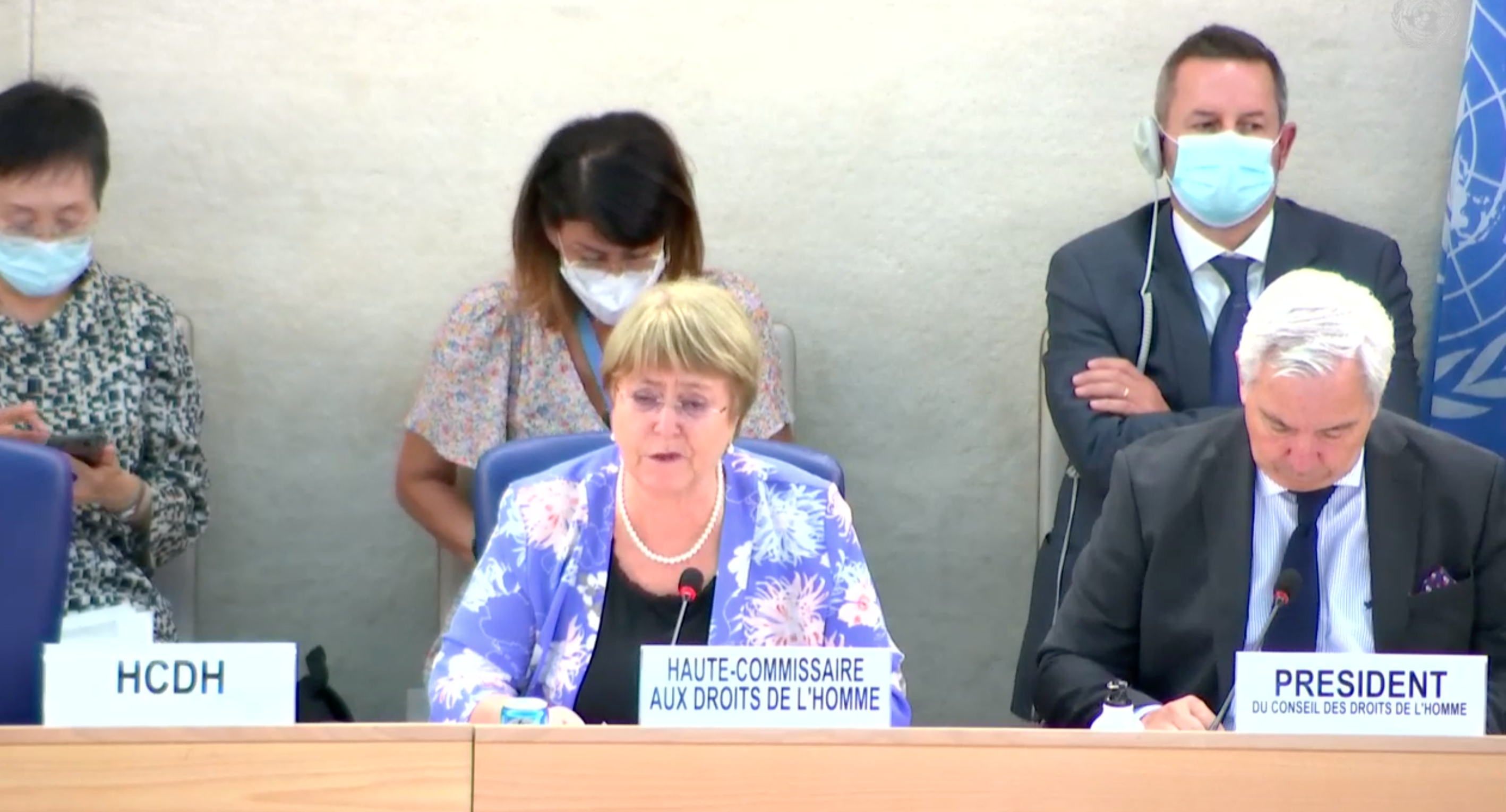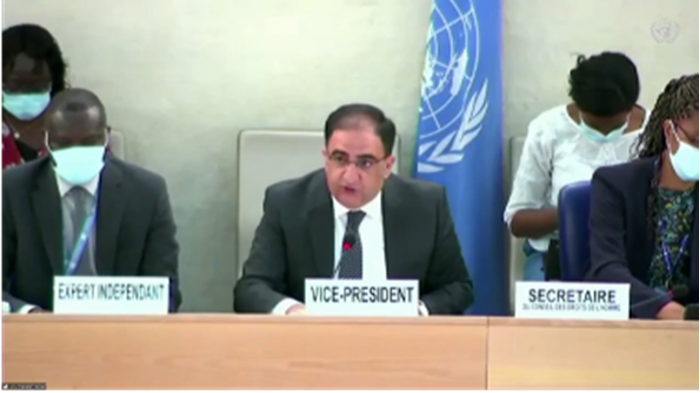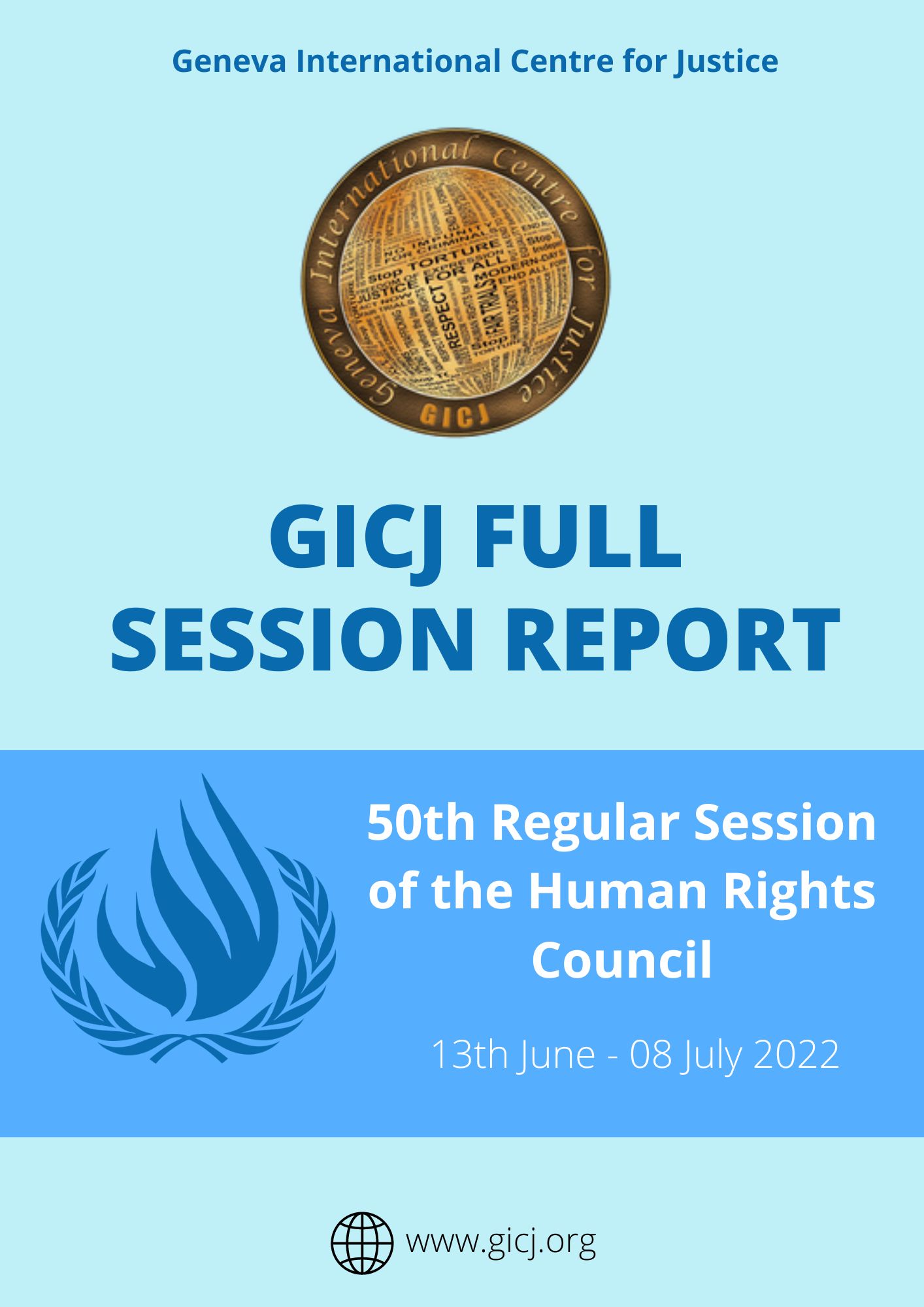The 50th Regular Session of the Human Rights Council (HRC) was held at the Palais des Nations in Geneva, Switzerland from 13th June to 8th July 2022. The Session contained 8 panel discussions, 9 interactive dialogues, 27 dialogues with special procedure mandate holders, and the appointment of 8 special procedure mandate holders.
On 1st July 2022, the Council held an Urgent Debate on the human rights situation of women and girls in Afghanistan. At the end of the Urgent Debate, the Council adopted a resolution on “the situation of human rights of women and girls in Afghanistan”. A special commemorative event was held to mark the 50th session on the 15th of June 2022.
In the final week of the Session, the President of the HRC announced the appointment of 4 new Special Rapporteurs and 3 Working Group members
The Council adopted 23 resolutions and decisions on the outcome of the Universal Periodic Review in respect of countries along with a decision to commence the 4th UPR cycle.
Click on the titles below to view each section.
On 13th June 2022 Mr Federico Villegas, President of the Council opened the 50th Session of the Human Rights Council, the High Commissioner for Human Rights, Michele Bachelet also delivered her Annual Report during the opening session which was followed by an Interactive Dialogue on 14th June 2022.
The President introduced a special Interactive Dialogue on States’ responses to the pandemic. The Council also heard from dignitaries from Equatorial Guinea, Indonesia, and Sri Lanka.
1) Mr Federico Villegas, President of Human Rights Council proposed delegates to use the anniversary of the 50th Session of the Council to reflect on the role, contribution, and motivation of each constituent part of the HRC machinery.
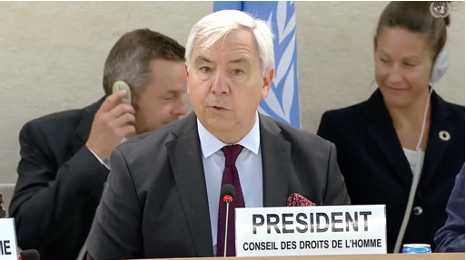 In commemoration, he presented statistics that since 2006, the HRC has held 2,007 formal meetings, 34 special sessions, 7 urgent debates, 932 interactive dialogues, 232 panel discussions, 1,372 resolutions, established 18 thematic special procedures, 8 country-special procedures, and 35 investigative mechanisms.
In commemoration, he presented statistics that since 2006, the HRC has held 2,007 formal meetings, 34 special sessions, 7 urgent debates, 932 interactive dialogues, 232 panel discussions, 1,372 resolutions, established 18 thematic special procedures, 8 country-special procedures, and 35 investigative mechanisms.
The identified that the high level of NGO and other engagement underscores the importance of the HRC’s work. He concluded that the Council must always be open to constructive criticism in order to improve the work that it carries out. In contrast he deplored inappropriate personal attacks and threats towards mandate holders who should be free to carry out vital work without fear of retribution.
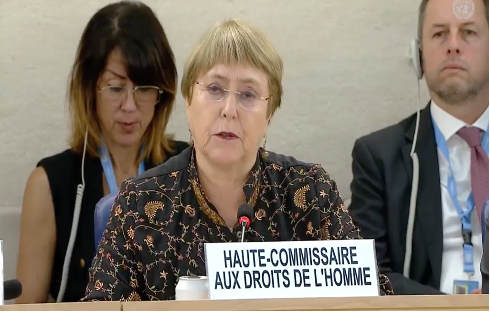 2) Ms Michelle Bachelet, UN High Commissioner for Human Rights
2) Ms Michelle Bachelet, UN High Commissioner for Human Rights
Delivering her Annual Report, the High Commissioner covered a broad range of topical issues, expressing concern for trends in human rights protection including the impact of conflicts, including in Ukraine, on the global fuel and financial crisis that will lead to increasing numbers experiencing poverty. She warned that food insecurity is increasing whilst inequalities within and between countries are skyrocketing which threatens the progress made towards implementing the sustainable development goals as part of the post-Covid recovery.
The High Commissioner called on states to address the conditions that provoke crises and to recommit to their agreement to build transformative societies and greener economies with urgent action required to meet the sustainable development goals.
Her Annual Report highlighted four specific areas of intervention to tackle - inequality and discrimination, utilisation of national budgets to integrate human rights programmes and expand social protection, international cooperation and solidarity with indebted countries, and finally greater protection of civic space to make civil society engagement safer.
The High Commissioner outlined issues raised on two country visits to Afghanistan and China. She additionally covered a range of country-specific concerns that have arisen in the last year that requires critical action.
Concluding her last briefing to the HRC she denounced the polarisation that drives states apart. She called upon states to identify common ground and engage in dialogue with a common purpose, with greater sense of collective responsibility and an ambition that puts people and their rights first.
91 countries and 2 UN agencies made comments during the Interactive Dialogue on various aspects of the High Commissioner's Annual Report with countries particularly raising the issues of food security, the risks of conflict, and expressed their support to the High Commissioner in fulfilling her mandate.
GICJ’s participation in the 50th Regular Session of the Human Rights Council was as follows:
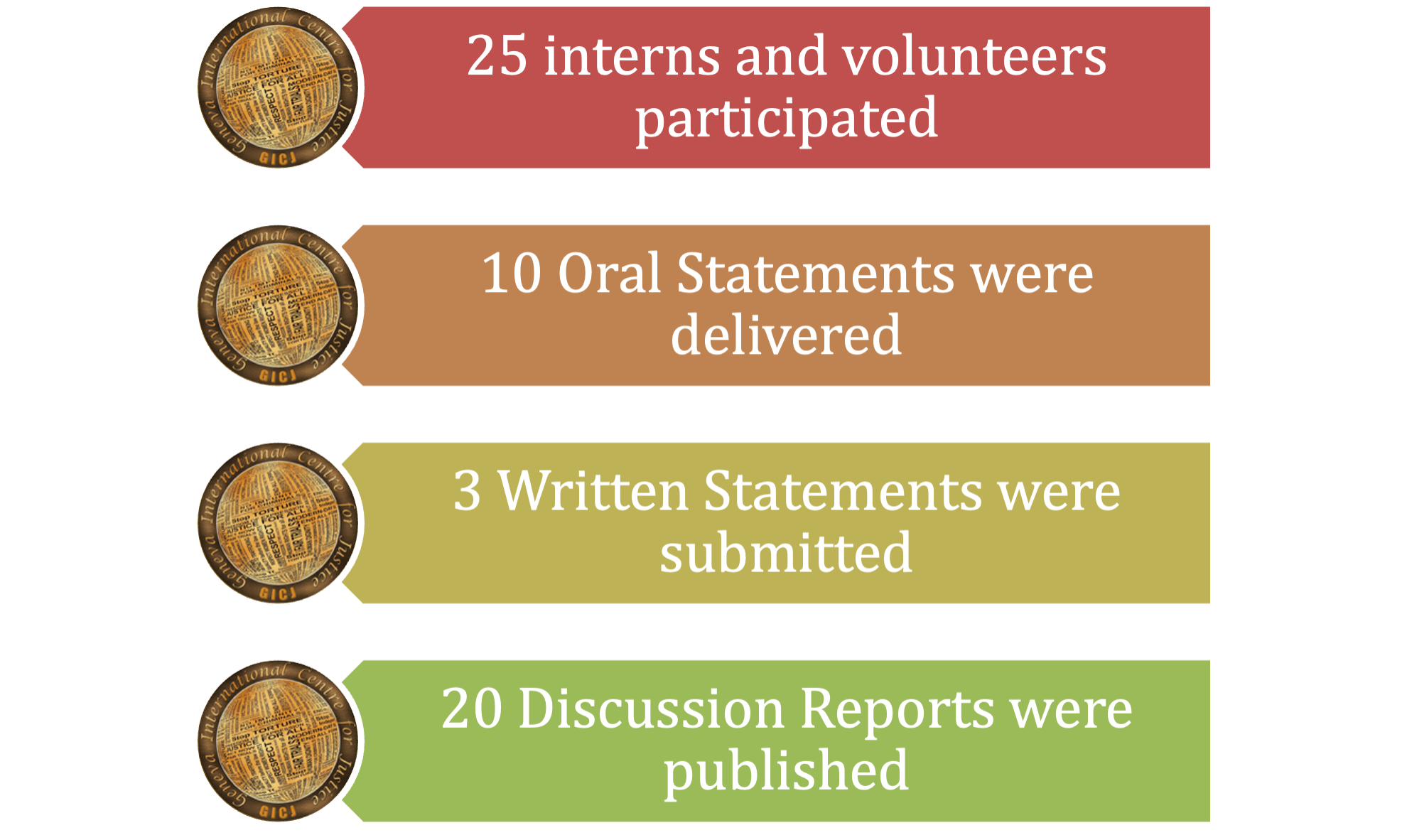
During the 50th Session of the UN Human Rights Council, Geneva International Centre for Justice (GICJ) delivered 10 oral statements in collaboration with the International Organization for the Elimination of All Forms of Racial Discrimination (EAFORD), Association Ma’onah for Human Rights and Immigration and Meezaan Center for Human Rights.
Item 1: Urgent debate on human rights of women and girls in Afghanistan
Statement with Meezaan Center for Human Rights and Geneva International Centre for Justice
Delivered by Yasmine Darwish / GICJ
Thank you, President.
We are here to reaffirm something that should not need to be said in 2022: women’s rights are human rights. Following their takeover, the Taliban promised to uphold the rights of all. Instead, they have announced more than 30 policies that are systematically eliminating women and girls from all aspects of society.
Measures such as the suspension of girls’ secondary education are depriving 1.1 million girls of a future. The denial of education not only violates their human rights, but it also leaves them more exposed to violence, poverty and exploitation. The severe barriers to employment, the absence of opportunities to participate in political and public life, as well as the limits on freedom of movement, association, and expression, fit the pattern of absolute gender segregation and are aimed at making women invisible in society.
We are appalled by the harsh manner with which the de facto authorities have responded to Afghan women claiming their fundamental rights, with reports of peaceful protesters beaten, ill-treated, threatened, and in confirmed instances detained arbitrarily.
Meezaan and Geneva International Centre for Justice strongly condemn the imposition of these measures that disempower half of Afghanistan’s population. Structural discrimination such as this is deeply damaging for the country’s prospects of future recovery and development. Afghan women deserve to live in dignity and to actively participate in building their country after years of occupation and war.
Item 1: Urgent debate on human rights of women and girls in Afghanistan
Statement by Association Ma’onah for Human Rights and Immigration and Geneva International Centre for Justice
Delivered by Anyssa Boyer / GICJ
Thank you, President.
We thank you for convening this urgent debate on the concerning human rights situation of women and girls in Afghanistan. Following the Taliban’s violent seizure of power in August 2021, Afghan women and girls’ human rights have been continuously undermined, hindering their freedoms and dignity.
Afghan women and girls have been exposed to different forms of structural violence including child trafficking, forced marriage, and sexual exploitation. While the need for adequate survivor centres continues to grow, these services have been forced to decrease their operating capacities. Remaining service providers are consistently targeted and threatened for supporting women and girls’ fundamental rights. Furthermore, on 3rd of December 2021, the de-facto Taliban Government announced a “Special Decree on Women’s Rights,” recognising women as “noble and free human beings.” The Decree affirms that women and widows should not be forced into marriage and are entitled to a share of their husband’s property. These commitments are not being met.
Ma’onah and Geneva International Centre for Justice stand with Afghan women and girls. We highly condemn the systematic human rights violations and urge the Government to enforce the Law on the Elimination of Violence Against Women, the Convention on the Elimination of all Forms of Discrimination Against Women, and the 2018 Security Council resolution 2405, all largely overlooked by the Afghan criminal justice system. We call on the international community to hold the de facto Taliban government accountable for its actions and immediately halt all forms of violence against women and girls.
Item 2: Interactive Dialogue on High Commissioner Oral Update on Myanmar
Statement with Association Ma’onah for Human Rights and Immigration and Geneva International Centre for Justice
Delivered by Sivar Ahmed / GICJ
Thank you, president,
We thank the High Commissioner for the oral update. We want to express our deep concerns about the alarming human rights situation in Myanmar from extrajudicial killings, sexual and gender-based violence, mass arbitrary arrests, torture and death penalties.
The recently announced decision to enforce death sentences against four individuals explains the level of human rights violation that the Military regime reached in Myanmar. In addition, the regime attempts to establish a new dictatorship by imposing more restrictions on access to the internet, online censorship, and other internet barriers. After the military coup in February 2021, Myanmar experienced nationwide internet blackouts and no access to social media platforms. Recently, authorities have imposed an internet shutdown on areas where they face great resistance from opposition groups.
Ma’onah and Geneva International Centre for Justice urge the International Community, including this Council, to impose more pressure on the Military Regime in Myanmar to stop violence and protect human rights. Without accountability, there will be increasing violence and crimes against humanity. We believe that access to the internet and information is one of the fundamental rights, and any restriction on it is unacceptable. Therefore, we stand with the people of Myanmar and call on the international community to take action and break the silence against the continued human rights violations in Myanmar.
Item 4: Interactive Dialogue on oral update of Commission of Inquiry on the Syrian Arab Republic
Statement with Meezaan Center for Human Rights
Delivered by Sarah Tayara / GICJ
Thank you, President.
We share the Commission’s concerns regarding arbitrary detentions in Syria. Tens of thousands of civilians remain illegally detained in Syria’s ‘notorious’ prisons and detention centres.
To be detained in Syria is to be missing. It is to be subjected to torture, and inhumane and degrading treatment with little hope of being found. Arbitrary detentions are used as a means of prolonging the suffering of hundreds of thousands of family members by withholding information on the fate of their loved ones.
In the words of Mohammad, a refugee I met when travelling to refugee camps in Tripoli, Lebanon in July 2021 whose father, brother and 4-year-old nephew were detained: “knowing they were detained meant knowing they were suffering.”
In May 2022, thousands waited in pain in the streets of Damascus hoping to find their loved ones alive after the Government’s most recent amnesty. Others watched agonizing videos of murders to discover if they were killed following the release of the footage showing civilian executions in Tadamon in 2013.
Meezaan Center for Human Rights and GICJ call upon all parties to immediately release all arbitrarily detained civilians. We support the commission’s recommendation for the establishment of an international mechanism for locating those arbitrarily detained and reuniting them with their loved ones. Arbitrary detentions are a stain on the conscience of both the Syrian authorities and the international community. We must act now on behalf of tens of thousands of Syrian victims which have been left to fall through the cracks of the brutal conflict.
Item 6: Interactive Dialogue with Commission of Inquiry of the Syrian Arab Republic
Statement with Association Ma’onah for Human Rights and Immigration
Delivered by Amal Bushara / GICJ
Thank you President.
Although the exact number is unknown, since the start of the conflict in Syria in 2011, at least tens of thousands of Syrians have been forcibly detained, abducted, or disappeared at the hands of the government, armed opposition groups, and terror organisations operating in the country. Victims of enforced disappearances are effectively striped of all their rights, including the rights to a fair trial and due process of law, while their relatives experience ongoing violations of their rights, such as having an unclear legal status, facing discrimination and social stigma, and not having access to a standard of living or education that is adequate. Women make up a fraction of those who have vanished in Syria, but they face intensified economic, social, and psychological hardships as a result of the loss of their male counterparts. A woman's claim to estate in the absence of her male family members is often tenuous, leaving the family in a state of a legal and socio-economic limbo. Association
Ma’onah and Geneva International Centre for Justice support calls for the establishment of a consolidation body that efficiently tracks and identifies those missing and assists their families. Such a mechanism should remain accessible and confidential in the sense that it protects the identities of those seeking assistance as well as assist families regardless of where they reside, as they too are victims.
Item 6: Universal Periodic Review Outcomes – Syrian Arab Republic
Statement with Meezaan Center for Human Rights
By Yasmine Darwish / GICJ
Thank you, President,
We welcome Syria’s acceptance of recommendations to criminalise, in both law and practice, the use of torture and other forms of cruel, degrading or inhuman treatment or punishment, and combat sexual violence and commitment to release all those who are arbitrarily detained or forcibly disappeared. However, we remain concerned that despite similar commitments in its previous UPR, there have been no tangible results in the investigation of torture allegations and to date no one has been held accountable despite a number of such claims brought before the judiciary. While Meezaan and Geneva International Centre for Justice commend Syria for passing an anti-torture law on March 30, 2022, we documented the deaths of at least 11 individuals due to torture in detention centres since the issuance of the law and continue to document brutal torture cases and deaths due to torture.
We regret that Syria did not commit to establish national mechanism to identify and hold accountable all perpetrators engaged in human rights violations and abuses, especially arbitrary detention, torture, abduction and enforced disappearance of tens of thousands of individuals. The longstanding, blanket impunity enjoyed by the security forces who commit such crimes is the main factor perpetuating the wholesale violations of international human rights and humanitarian law.
We further regret Syria’s rejection of the recommendations to ratify the Optional Protocol to the Convention against Torture and Other Cruel, Inhuman or Degrading Treatment or Punishment. The use of torture and other inhuman treatment in detention is widespread against individuals suspected of having participated in demonstrations, journalists, web bloggers, defectors of security forces, women and children. Children are often arbitrarily detained or killed during demonstrations. There are extensive reports of sexual violence committed by public officers against women.
Item 6 : Universal Periodic Review - Adoption of the Syrian Arab Republic’s review
Statement with Association Ma’onah for Human Rights and Immigration and Geneva International Centre for Justice
Delivered by Farah C. / GICJ
Thank you President,
Ma’onah and Geneva International Centre for Justice thank the working group for their report.
Although we carefully reviewed the national report made by the Syrian Arab Republic , and we acknowledge the answer provided to the previous recommendations about judicial safeguards and fair trial, we just can’t ignore the gap between the government’s claim and the reality.
The national report asserts that the protection of Human Rights, including access to justice, is effectively guaranteed based on the Constitution and the Criminal Law. Unfortunately, the independent judicial system is still compromised by the blatant culture of impunity denounced by thousands of Syrians as being the prevailing norm, at all levels of society.
Along with an effective judicial system, we urge the state under review to effectively implement the recommendations constantly reiterated since the previous UPR. These addressed the different legal shortcomings, especially regarding women, children and vulnerable persons. Although we welcome the first steps taken to empower them, such as the review of the article banning “honour crimes”, and the current review of the Personal Status Act, we call for the government to ensure an independent judicial system and reparation for victims, as recommended. (133.161)
In addition, with 88 court cases reported in 2019 prosecuting enforced disappearances perpetrators, we are far from accountability for the 100 000 still missing. Which is why, we strongly support the call of Member States for the creation of an international mechanism to coordinate the claims regarding missing persons and the adoption of the convention on enforced disappearances. (133.155)
Ma’onah and GICJ would like to remind the Syrian government that the only way to ensure the security of its people, especially the most vulnerable ones, is to guarantee them a fair and independent judicial system, with a proper body of law. Until then, no sustainable peace can be reached.
Item 6: UPR Adoptions South Sudan
Statement with the International Organization For the Elimination of All Forms of Racial Discrimination
Delivered by Anyssa Boyer / GICJ
Thank you, President.
We thank the Republic of South Sudan for its engagement in the Universal Periodic Review and welcome the report of the Working Group. While we welcome measures taken to address women’s human rights, we would like to emphasise the continuous violations that threaten women’s freedoms, fundamental human rights, and lives.
We remain deeply concerned about the ongoing human rights violations faced by women in the country. The South Sudan Report of the OHCHR highlighted that since the 2013 conflict, women’s exposure to sexual violence has remained staggeringly high. These include instances of rape, abduction, sexual slavery, sexual mutilation, and sexual torture. Perpetrators continue to violate women’s rights and are not held accountable for their actions and as a result, enjoy blatant impunity. South Sudan lacks appropriate mechanisms and institutions to address violence against women which coincides with the anti-gender-based violence bill which has yet to be submitted to Parliament. Therefore, we encourage the implementation of recommendation 113.218 which calls to enhance the protection of women and girls against discrimination, forced marriage and gender-based violence by bolstering the legal framework and fully implementing the legal provisions on gender equality and sexual violence.
While we acknowledge the government’s ratification of the Convention on the Rights of the Child and the Convention on the Elimination of All Forms of Discrimination against Women, we call on South Sudan to ratify key instruments to protect women which include the International Covenant on Civil and Political Rights and the International Convention for the Protection of All Persons from Enforced Disappearance.
EAFORD and Geneva International Centre for Justice urges South Sudan to implement additional legal frameworks to promote and protect women’s rights. We call on South Sudan to include women in participative decision-making processes both in political and social spheres. South Sudan should halt all harmful practices that target women’s dignity and have long-lasting effects on their physical, social, and psychological trauma that persists throughout generations.
Item 6: UPR Adoptions Sudan
Statement with International Organization For the Elimination of All Forms of Racial Discrimination and Geneva International Centre for Justice
Delivered by Natalia Venegas / GICJ
Thank you, President,
We welcome the report of the Working Group and thank Sudan for participating in the Universal Periodic Review. Nevertheless, we would like to address the issue of violence against children.
We welcome all the measures taken by the government of Sudan to protect children, including public policy to prevent child marriage and the prohibition and the inclusion of female genital mutilation as a criminal offence, which affects girls primarily. Also, the creation of special mechanisms to prevent and combat child recruitment as the children's rights unit.
Nevertheless, the reality on the ground demonstrates that children continue to face additional human rights challenges including killing, mutilation and sexual violence. . Children are also at risk of being subjected to corporal punishment, however any form of punishment, whether corporal or otherwise, should not be used at home or in any other setting in which adults have authority over children.
It is essential to highlight that girls form part of the most vulnerable group of the population. Most women in Sudan are married young, with the legal age for marriage being ten years old, if permission is granted from an elder. Child marriage is still a common practice in Sudan, despite all the international conventions that protect girls, such as the Convention on the Rights of the Child.
EAFORD and Geneva International Centre for Justice strongly encourage the government of Sudan to protect children against violence, as they are the future of our society. Children are one of the world's most vulnerable groups because they are unable to protect themselves. It is particularly concerning to see children in armed conflict, as everything they experience during their youth shapes them forever, traumatic events such as being recruited or being a victim of violence can have a devastating effect on a child's psychological development and future. We urge the government of Sudan to strengthen national mechanisms to combat violence against children, especially in armed conflicts, and to ensure the safety and well-being of children, as well as hold perpetrators accountable for their crimes.
Item 6: Universal Periodic Review Outcomes – Sudan
Statement with Meezaan Center for Human Rights
Delivered by Yasmine Titouni / GICJ
Thank you President,
We are pleased to note Sudan’s acceptance of the UPR recommendations related to the amendment of national legislation in line with international human rights law, including with regard to the right to freedom of expression and freedom of peaceful assembly by respecting the freedom of the media and avoiding all disproportionate use of force.
We further welcome Sudan’s acceptance of recommendations to ratify the Convention on the Elimination of All Forms of Discrimination against Women and commend the great emphasis their constitutional document placed on women’s rights.
As gender-based violence remained hugely underreported, we recommend that the Sudan continue to promote women’s rights and combat discrimination against women through legal reforms, including those of the Criminal Code of 1991 and the Personal Status Law, by consulting civil society, including women’s organizations.
We note, however, that Sudan rejected recommendations to immediately open civic space and defend freedom of expression and assembly for all Sudanese, including civil society actors, human rights defenders and journalists. Women protesters, journalists, lawyers and human rights defenders are facing increasing attacks since the military coup of 25 October 2021. The emergency law is used to arrest and prosecute women activists. Civic space for women's rights groups is shrinking, while violence against women is increasing across the country. Since the coup, over 93 protesters were killed, at least 3000 were injured and over 2500 individuals were arrested
Meezaan and Geneva International Centre for Justice call on the current authorities to stop its grave and systematic violations against Women Human Rights Defenders and women protestors and:
- to ensure an immediate international and independent investigation into the crimes committed by Sudanese security forces causing injuries and permanent damage to women protestors,
- and to ensure accountability for the crimes of sexual violence committed by security forces.
After attending various Interactive Dialogues and Panel Discussions, GICJ drafted multiple reports summarising the meetings and outcomes. GICJ has published a total of twenty reports on various human rights topics that were covered during the 50th Human Rights Council Session.
Israel’s occupation, a fuel to the persistent cycle of violence
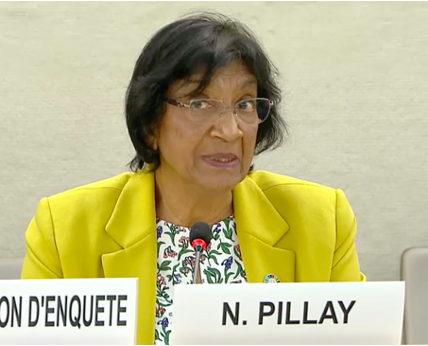
By Yasmine Darwish and Danya Al-Thani / GICJ
On June 13th, the Human Rights Council established an Independent International Commission of Inquiry (COI) to investigate all allegations of violations of international humanitarian law (IHL) in the OPT. The COI assessed the implementation of recommendations from previous United Nations fact-finding missions and commissions of inquiry on the situation.
It found that “the key findings and recommendations linked to the underlying root causes of recurrent tensions, instability and protraction of conflict have not been implemented. Hence, there is a lack of implementation at the heart of the systematic recurrence of violations of Palestinians rights in the OPT”.
The UN Human Rights Council (HRC) mandated the Commission on 27 May 2021 to “investigate, in the Occupied Palestinian Territory, including East Jerusalem, and in Israel, all alleged violations of IHL and all alleged violations and abuses of international human rights law leading up and since 13 April 2021”. Furthermore, the COI commanded to “investigate all underlying root causes of recurrent tensions, instability, and protraction of conflict, including systematic discrimination and repression based on national, ethnic, racial or religious identity.” As the chair, Navanethem Pillay was appointed to lead the Commission, while Miloon Kothari and Christopher Sidoti were appointed to serve as members.
The COI highlighted “Israel’s failure to uphold the laws and customs of war, including those of belligerent occupation, violations and abuses of individual and collective rights, and a lack of accountability”. Despite Israel’s refusal to cooperate with the commission and denying entry into the country, Ms Pillay said “the occupation must end now; all persons in Palestine and Israel must be afforded all their human rights, without discrimination, including their right to live in peace and security alongside their neighbours.” She further urged “the international community [to] adhere to its international obligations to ensure full respect for international law in Israel and the Occupied Palestinian Territory, and work towards ensuring that those responsible for international crimes are held to account.”
Geneva International Centre for Justice (GICJ) supports the work of the COI and regrets the lack of progress made in the conduct of domestic investigations contributing to the denial of access to justice for Palestinian victims and of their right to an effective judicial remedy. The international community must ensure that all law enforcement agencies comply with international human rights standards as well as impartial investigations are made into all deaths and injuries to identify the culprits and bring them to trial. Justice and accountability for the attacks against the Palestinian people must be held as well as guarantee to adequate compensation to the families of all victims and medical assistance to all injured people.
Click here to read the full discussion report.
Cycle of Violence and Alarming Human Rights Crisis in Myanmar after Military Coup
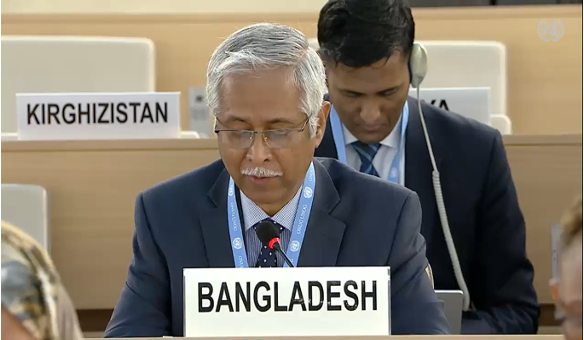
By Ardya Syafhana and Makaela Fehlhaber / GICJ
On the 14th of June, United Nations High Commissioner for Human Rights, Ms Michelle Bachelet, delivered an oral update on the situation in Myanmar. The High Commissioner drew attention to the “devastating consequences” of the military coup that ensued in 2021 amidst the international concerns about the purported genocide of ethnic minorities within the State. The consequence of the continued international human rights concerns has placed citizens “in a cycle of poverty and abuse”.
It was highlighted by the Office that there were reasonable grounds to believe the existence of crimes against humanity and war crimes instigated and continued by Burmese authorities. The focus was on the “amplified suffering of civilians” in the form of the use of human shields, the burning and indiscriminate attacks on civilian objects and the prosecution of political activists. Such persons are regarded as protected persons under the principles of International Humanitarian Law (IHL) in the absence of legal due process. Ms Bachelet emphasised collective actions by the international community through the imposition of restrictions on Myanmar’s business and financial sector and in the pursuit of accountability for crimes against humanity and war crimes. In doing so, the message from Ms Bachelet and her Office was to ensure the end of impunity.
The response of the representatives in attendance demonstrated a unified reaction to the pursuit of accountability for grave violations of international law, ceasing the persecution of minorities and protecting civilians and non-combatants at all costs. The representative of Lithuania, on behalf of the Northern Baltic countries, issued a strong condemnation in light of Myanmar’s absence and called upon the state to cooperate fully with the United Nations and its respective organs and permit access to those seeking to provide humanitarian assistance into its territory. Amongst the calls for the protection of civilians in armed conflict were the requests for Myanmar to issue a moratorium on the death sentences issued to political activists.
The events leading up to the 50th session of the Human Rights Council illustrate consistent reiterations of the human rights violations in the territory of Myanmar. This report details the findings of the Report of the Special Rapporteur on the Situation of Human Rights in Myanmar, the Report of the High Commissioner in the HRC 49th Regular Session and the Report of the Working Group on the Universal Periodic Review. All reports pertaining to the violations relative to the political, economic, and social freedoms of those residents in Myanmar, purported war crimes, crimes against humanity and allegations of genocide.
Geneva International Centre for Justice (GICJ) remains contingent on alliance with the protection of the rights enshrined in various international human rights instruments inter alia, the International Covenant on Civil and Political Rights (ICCPR) and the International Covenant on Economic and Social Rights. GICJ implores Myanmar to adhere to the principles relative to international humanitarian law, and above all, respect the right to life of all citizens but especially of the Rohingya people, and the four political activists sentenced to death in the absence of proper, due legal process. The actions of the international community are imperative in ensuring that appropriate measures and sanctions are implemented against Myanmar in an effort to preserve the rights of its citizens. Furthermore, GICJ encourages the state of Myanmar to respect neutral bodies, such as the International Committee for the Red Cross, in the deliverance of humanitarian assistance to individuals plagued by the aftermath of the armed conflict within its borders.
Click here to read the full discussion report.
The toll on Human rights following the Military Takeover in Sudan
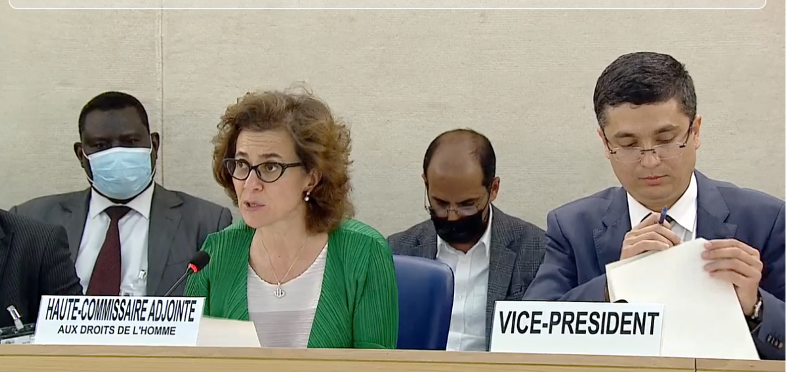
By Amal Bushara / GICJ
On the 15th of June, during the 50th session of the Human Rights Council, deputy High Commissioner, Ms Nada Al- Nashif, presented on behalf of the High Commissioner, a report detailing the situation of human rights since, and human rights violations and abuses committed during, the period of the military takeover. The oral update was followed by an enhanced Interactive Dialogue. The Acting Minister of Justice of Sudan and the Head of Human Rights Unit of the Human Rights Bar Association in Sudan were amongst some of the speakers that took to the floor during the interactive dialogue.
The High Commissioner's report, prepared with the assistance of the Sudanese Human Rights Expert, documents the various patterns of human rights violations that have surged during and after the military coup of 25 October 2021, including excessive use of force, unlawful killings, arbitrary arrest, torture, sexual and gender-based violence and attacks on hospitals and medical staff.
The Report notes that joint security forces have used excessive force in the past in reaction to peaceful anti-coup protests, particularly in Khartoum State (Khartoum, Khartoum North and Omdurman). Furthermore, it details that since mid-January 2022, joint security forces have been using shotguns to suppress protests, primarily in Khartoum State but also in Wad Medani, Al-Gazira State. Two men and three boys reportedly died as a result of being hit by shotgun pellets as of 10 April 2022, with at least 367 others injured.
The report also makes recommendations both for the Sudanese authorities as well as the international community. Some of the recommendations include credible steps towards the reinstatement of a civilian-led transitional government and investigate effectively, impartially and in a timely manner any allegation or reasonable suspicion of unlawful use of force or other violations by members of the joint security forces. This also includes sexual and gender-based violence, and to hold accountable those responsible.
During the enhanced dialogue, experts and state representatives alike, expressed their solidarity with the people of Sudan in their struggle for democracy. They called on authorities to put an end to the use of excessive force and their campaign of violence against civilians and celebrated the end of the state of emergency in Sudan, which enabled law enforcement activities to be carried out by joint security forces.
Geneva International Centre for Justice (GICJ) welcomes the High Commissioner’s report and its recommendations which call on the international community to engage with the Sudanese authorities, and support initiatives that will lead to the reinstatement of a civilian-led transitional government. GICJ encourages ongoing initiatives aimed at bringing about durable political solutions in Sudan that promote the protection of human rights for all . GICJ condemns all abuses of human rights perpetrated by the military and all other parties to the conflict in Sudan. It is imperative that Sudan forms a strong political foundation and implements democratic processes based on principles of fundamental human rights. Sudan’s Constitution is the cornerstone of democracy, and the government must uphold all rights set out in the Bill of Rights. GICJ welcomes the end of Sudan’s state of emergency, and hopes it will put an end to abuses of power perpetrated by national security forces. Citing data and evidence about human rights violations and abuses, including sexual and gender-based violence and enforced disappearances, patterns of mass arbitrary arrests of protestors, excessive force used against protesters we express concern. We further observe that no one has been held accountable for the victims' and their families' losses more than three years after the violent attack on peaceful protestors on 3 June 2019. The utter impunity for violations of human rights is worrying and therefore, we ask the Council to call on the Government of Sudan to launch timely, thorough, impartial, independent investigations into the alleged abuses of human rights and to prosecute those accountable.
Click here to read the full discussion report.
Mariupol Continuing to Witness Brutal Human Rights Violations Stemming from Russian Occupation
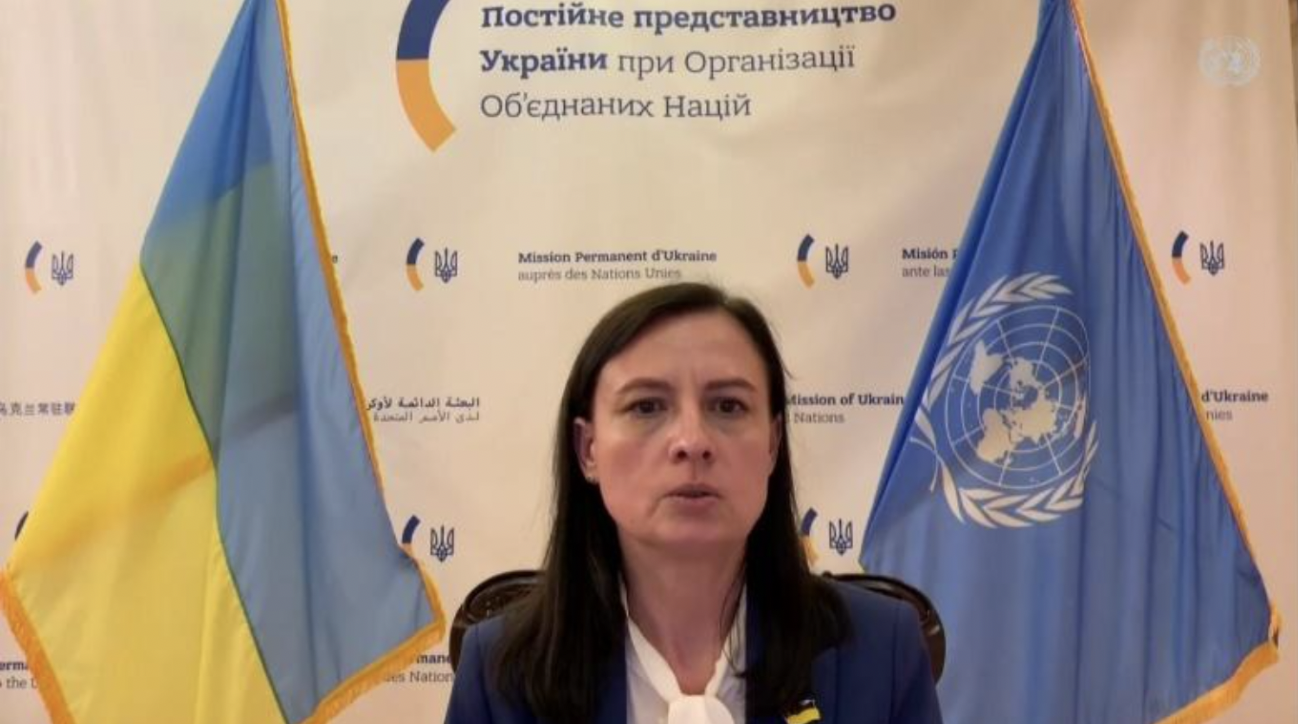
By Conall Corrigan / GICJ
On the 16th of June, Ms Michelle Bachelet, High Commissioner for Human Rights, provided an oral update on the grave human rights and humanitarian situation in Mariupol during an Interactive Dialogue at the 9th meeting of the 50th Session of the Human Rights Council (HRC).
The High Commissioner noted that her office is concerned about Russia’s non-compliance with its obligations under international humanitarian law (IHL) and the disastrous impact that hostilities have had on the lives of civilians within Mariupol. Ms Bachelet acknowledged that residents of the city have been forced to bear the brunt of the conflict and lamented the fact that, due to the inability of her office to access Mariupol since the beginning of hostilities in the area, she has not been able to gain first-hand access to the city; instead the office is relying on the accounts of those who have fled the area, and those who remain. She emphasised that Russia must uphold all of its international law obligations as the occupying power in Mariupol and stressed that her office should be granted effective access to the city, and other areas of Ukraine, in order to assess the treatment of civilians who have remained in the country. Ms Bachelet reminded the Council that pursuing justice and effective remedies for all victims of the conflict are crucial next steps for all authorities with the power to act.
The countries concerned within the oral update were then provided with the opportunity to present statements. The Russian representative claimed that Mariupol had been effectively liberated from what he termed “Ukrainian Nazi formations” and that Russian forces had returned peace and calm to the city. Conversely, the Ukrainian representative noted that Russia’s actions in Mariupol have highlighted the state's complete disregard for human rights and called on the international community to work with Ukraine to ensure those responsible for violating IHL are held to account.
In the ensuing discussion, states voiced concern regarding the current human rights and humanitarian situation in Ukraine and stressed the need to pressure Russia to end the conflict and respect IHL. Most representatives expressed support for investigations carried out by the ICC, and other initiatives including the Independent International Committee of Inquiry on Ukraine (COI), which are examining violations of human rights and IHL stemming from the Russian invasion. Member states pleaded for the cessation of violence and displayed solidarity with the people of Ukraine.
Geneva International Centre for Justice (GICJ) condemns Russian aggression within Mariupol and throughout Ukraine as a whole. The indiscriminate and disproportionate attacks carried out by Russian armed forces and affiliated armed groups represent a direct threat to Ukrainian citizens' right to life and greatly undermine the object and purpose of the UN Charter. It is vital that Russia agrees to abide by its obligations under international law and commits to withdrawing all troops based in Ukraine. The Russian state must provide the OHCHR monitoring team with unfettered and unhindered access to Mariupol to allow the UN to assess the living conditions of civilians on the ground as well as the treatment of POWs within detention facilities. Moreover, it is essential that the international community, and all investigative teams involved in documenting human rights violations perpetrated in the region, coordinate efforts to hold all actors accountable for any crimes they may have committed.
Click here to read the full discussion report.
Freedom of Peaceful Assembly and Association Increasingly Jeopardised by Lack of Funding
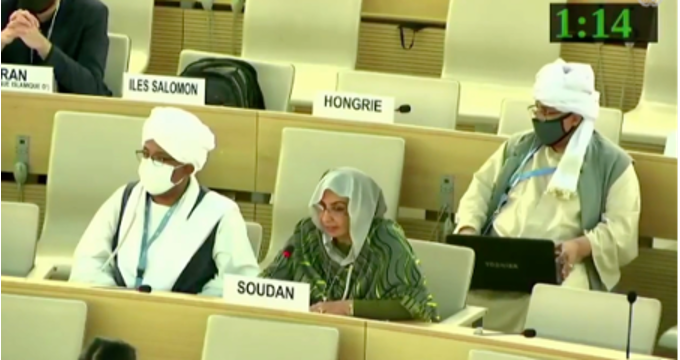
By Isabelle Despicht / GICJ
On 10 May 2022, the Special Rapporteur on the right to freedom of peaceful assembly and association, Clément Nyaletsossi Voule, submitted his report following resolution 41/12. During an Interactive Dialogue at the 50th Human Rights Council session, he presented his findings, engaging with various member states who expressed their views on the matter.
Amongst other things, the Special Rapporteur addressed problems regarding access to funding for civil society organisations and noted that the Covid-19 pandemic highlighted the importance of a "well-resourced civil society". He further explained that the pandemic had a negative impact on the availability of resources for organisations and the community they support.
During the interactive dialogue, various delegations took to the floor, many welcoming the work of the Special Rapporteur and his country visits. Other countries, however, denounced a double standard and pointed to ongoing violations in Western countries, which Mr Voule supposedly did not address enough in his report.
After receiving the statements of multiple delegations, the Special Rapporteur took the floor to respond to various inquiries made by the different states. He welcomed the issues raised by participants and the concerns presented about the limitations of peaceful protests and the limits to financing. He thanked delegations for their positive response to his report, as well as their criticisms, invited them to get in touch with his office, and emphasised his availability to discuss these matters at any time.
Geneva International Centre for Justice (GICJ) welcomes the report of the Special Rapporteur and commends his efforts and availability to assist the countries throughout his mandate. GICJ strongly condemns unjustified restrictions, contrary to the derogations provided for under the ICCPR, which many people were subject to as a direct result of the pandemic. As noted by the Special Rapporteur, GICJ believes that freedom of peaceful assembly and association forms the backbone of democratic societies: Their exercise is vital, as they provide a platform for dialogue with civil society to address various needs.
Click here to read the full discussion report
Indigenous Women and Girls’ Rights are Human Rights
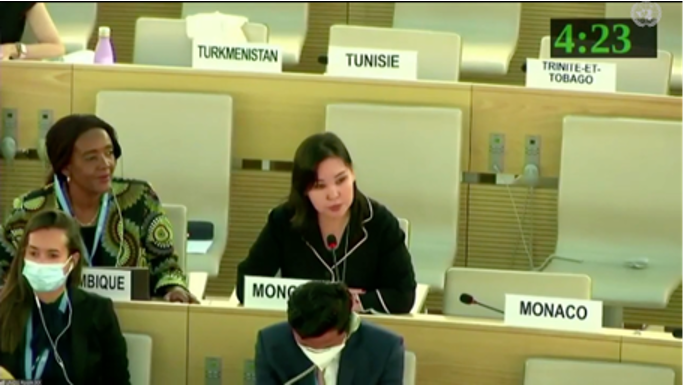
By Anyssa Boyer / GICJ
On the 20th of June, at the 12th meeting of the 50th Human Rights Council, Special Rapporteur, Reem Alsalem presented her report to the Council and followed by an Interactive Dialogue on violence against women, its causes, and consequences.
Ms Alsalem shed light on the deep-rooted vulnerabilities of indigenous women and girls to complex and intersectional forms of violence that stem from patriarchal power structures, racial and ethnic discrimination, and socio-economic standing. She underlined indigenous women’s fear of stigmatisation, language barriers, and re-victimisation risks. The Special Rapporteur voiced her concern on women’s serious barriers particularly gender-based violence that hinder the realisation of their self-determination and human rights. She stressed that the COVID-19 pandemic exacerbated pre-existing forms of gender-based inequalities and urged States to better deal with crises to come as well as the current environmental crisis we are facing. Ms Alsalem underlined the clear nexus between gender violence and the climate crisis. She explained that the climate crisis exacerbates the rates of violence against indigenous women, hindering their active involvement in climate conservation practices. Indigenous women also lack recognition as human rights defenders and are important agents in our fight against climate change. The Special Rapporteur reminded the council and members of the international community that such women must be recognised as resilient actors capable of transformational changes.
Geneva International Centre for Justice (GICJ) strongly condemns all violence against women and we commend the Council for bringing indigenous women and girls’ voices to light. GICJ urges state governments to protect victims of gender-based violence. We fully extend our support in the fight for the elimination of violence against women and call on state representatives to protect and defend indigenous women and girls’ rights. Impunity for crimes against women and girls remains widespread and GICJ implores state governments to hold perpetrators accountable for their actions. We acknowledge the patriarchal norms and legacies of colonialism that hinder indigenous women and girls’ rights to self-determination and further expose them to different forms of violence.
GICJ calls on the international community, international organisations, and civil society to provide indigenous women and girls’ better access to legal justice systems and reparation programmes. Furthermore, we recognise indigenous women and girls who advocate for their rights as human rights defenders and urge the international community to promote and protect women and girls who actively engage in public and political life as well as advocacy and activism. We also remain deeply concerned with the environmental crisis and are alarmed at its direct effect on indigenous communities including women and girls. Finally, GICJ reminds the international community of its responsibility to ensure that all human rights violations further exacerbated by the environmental crisis are mitigated and that all forms of violence stemming from this ongoing crisis are prosecuted.
Click here to read the full discussion report
Interference with Legal Professionals' Freedom and Independence Undermines the Rule of Law
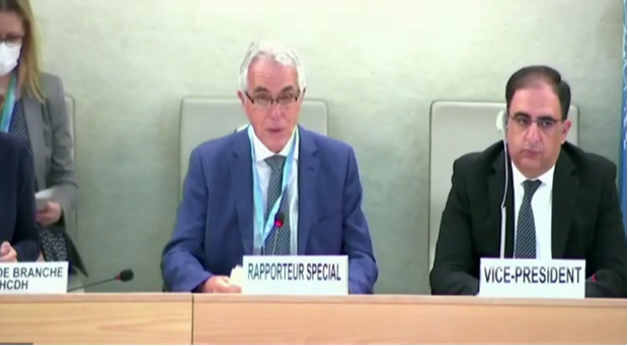
By Natalia Venegas / GICJ
On 21 June 2022, the Human Rights Council (HRC) held an Interactive Dialogue with the Special Rapporteur on the Independence of Judges and Lawyers about the protection of Lawyers Against Interference in the Free and Independent Exercise of the Legal Profession. Lawyers around the world currently face numerous threats, especially those who are actively fighting corruption, defending human rights, or protecting vulnerable groups. Individuals who practice law should be able to do so without fear of intimidation, obstruction, harassment or interference from the State.
As he presented his report, Mr Diego García-Sayán expressed his gratitude to Bolivia for its cooperation and openness to implementing his recommendations. He also noted a global increase in practices that limit and restrict the practice of law, especially as a result of measures adopted by States during the Covid-19 pandemic. Additionally, he reported that from 2010 to 2020, over 2,500 lawyers were killed, detained or kidnapped across the globe in an attempt to undermine the profession's independence.
His report also highlighted the most important international standards to protect judges and lawyers; the trends and patterns of interference in the free practice of law, such as the defence of human rights in cases related to national security or corruption; and the association of lawyers with their clients. Mr García-Sayán also raised concerns and explained the means of interference in the legal profession, including government interference in the organisation, administration, and functioning of lawyers' associations and organisations. His primary recommendations included that States take all necessary measures to ensure the free exercise of the legal profession and should review, amend or refrain from the adoption of legislation that may interfere with the independence of lawyers and the free exercise of their profession.
During the interactive dialogue, most States agreed that the legal profession and its free exercise are essential for the rule of law and an independent State. Furthermore, it was stressed the importance of the functions of judges and lawyers and the need to protect the independence of the judicial system, since lawyers have experienced a number of attacks and interference. Lastly, most States highlighted that the independence of the judiciary is fundamental to any democratic society. Nevertheless, some members questioned the Special Rapporteur's objectivity and their involvement in the report.
During his closing remarks, the Special Rapporteur referenced international principles adopted by the United Nations more than 30 years ago which establish the State's duty to guarantee the function and autonomy of the legal profession and bar associations. He concluded by noting that the goal was to systematise the principles of judicial independence and access to justice, as a fundamental human right which must be guaranteed.
Geneva International Centre for Justice (GICJ) strongly condemns the attacks against lawyers defending human rights and fighting corruption. We extend our support to the fight for judicial independence and the protection of the legal profession. As a pillar of the rule of law and a guarantee of fundamental rights such as due process and freedom, States should protect the legal profession and guarantee the independence of the judiciary.
Click here to read the full discussion report
The Need of International Standards in Medico-legal Death Investigation for the Protection of the Right to Life
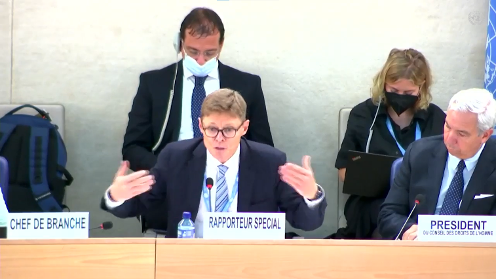
By Gian Heimann / GICJ
The 15th meeting of the 50th Regular Session of the Human Rights Council (HRC) considered the report of Mr Morris Tidball-Binz, Special Rapporteur on extrajudicial, summary or arbitrary executions (A/HRC/50/34), during an Interactive Dialogue. With his report, Mr Tidball-Binz, himself being a forensic doctor, set the agenda on global standards on forensic sciences and death investigation systems. He explained that with little investment, medico-legal death investigations can achieve significant outcomes in justice and public health. However, he also warned the HRC that at the present day, there is insufficient capacity at the global level to conduct such investigations.
The report called “Medico-legal death investigations” (A/HRC/50/34), presents the findings of a study the Special Rapporteur conducted on the global state of forensic science and death investigation systems. The report elaborates on the importance of the duty to investigate death, stating that a failure to conduct a proper investigation is, in itself, a violation of the right to life. In the report, global shortcomings and difficulties concerning the issue, such as a lack of independence of forensic doctors and staff, are presented. Lastly, the report contains clear and practical recommendations to the States.
During the Interactive Dialogue, many States thanked the Special Rapporteur for his report and expressed agreement with the importance of international standards and best practices of medico-legal death investigation systems. States also used the opportunity to draw attention to violations of the right to life in different regions of the world. Others shared national experiences in forensic science and investigation systems in the dealing and accounting of past violence such as armed conflicts. Finally, NGOs condemned numerous countries that know practices of extrajudicial, summary, or arbitrary executions.
Geneva International Centre for Justice (GICJ) would like to thank the Special Rapporteur for his report and support his effort to establish minimum standards and best practices for a worldwide medico-legal death investigation system. We are deeply shocked by the abhorrent practices of extrajudicial, summary, and arbitrary executions. These should under no circumstances, remain with impunity.
Click here to read the full discussion report
Realism in the Context of Human Rights and the Climate Crisis
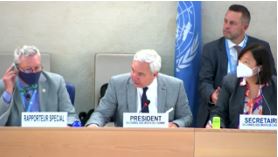
By Amie Sillito / GICJ
The United Nations Human Rights Council extended its mandate in the Central African Republic (CAR) regarding the human rights abuses and the current political instability in the country. The Independent Expert commended the CAR government on progress made in the country since his last report on tackling impunity and ensuring redress for victims of human rights violations.
The current threat against humanitarian aid workers was discussed as well as the lack of action taken against the illegal arms trade in the country following the arms embargo. The presence of international mercenary groups was also highlighted during the Interactive Dialogue and the government was encouraged to expel all actors who did not conform to the ceasefire or respect human rights and humanitarian law. The responses of most delegates were positive and numerous representatives confirmed that they would continue to support the CAR government and its efforts as well as the Expert’s work. It was suggested that the CAR should find an African solution to its African based problems instead of implementing international solutions to its domestic affairs.
Geneva International Centre for Justice (GICJ) commends the Special Rapporteur on the mandate and encourages all states to take urgent and appropriate action to combat global warming and protect vulnerable communities. The climate crisis will not affect everyone equally, and children will suffer disproportionately, with the poorest communities facing the largest burden. Governments must increase investments into climate adaptation and include the youth in discussions. The younger generation must be prepared and provided with climate education and green skills to prepare for the consequences of climate change. Inflated prices for oil and gas are a clear indication that the world needs to move away from its reliance on Russian natural resources following its invasion of Ukraine and pursue other avenues which include green technologies to power our nations. Efforts to combat global warming must be taken seriously as the livelihoods of future generations depend on it.
Furthermore, we encourage climate activists advocating for the protection of the right to a clean environment however we oppose property destruction and recent events including protestors from Just Stop Oil, who have taken extreme measures and glued themselves to historic paintings in art galleries. It is imperative that the right to protest is protected, and environmental activists are protected against different forms of litigation aimed at constraining these rights. We encourage all climate activists to exercise their human rights in a peaceful manner and avoid resorting to extreme measures in order to communicate the urgency of the climate crisis and the need for a solution.
Click here to read the full discussion report.
Human Rights of migrants and border governance
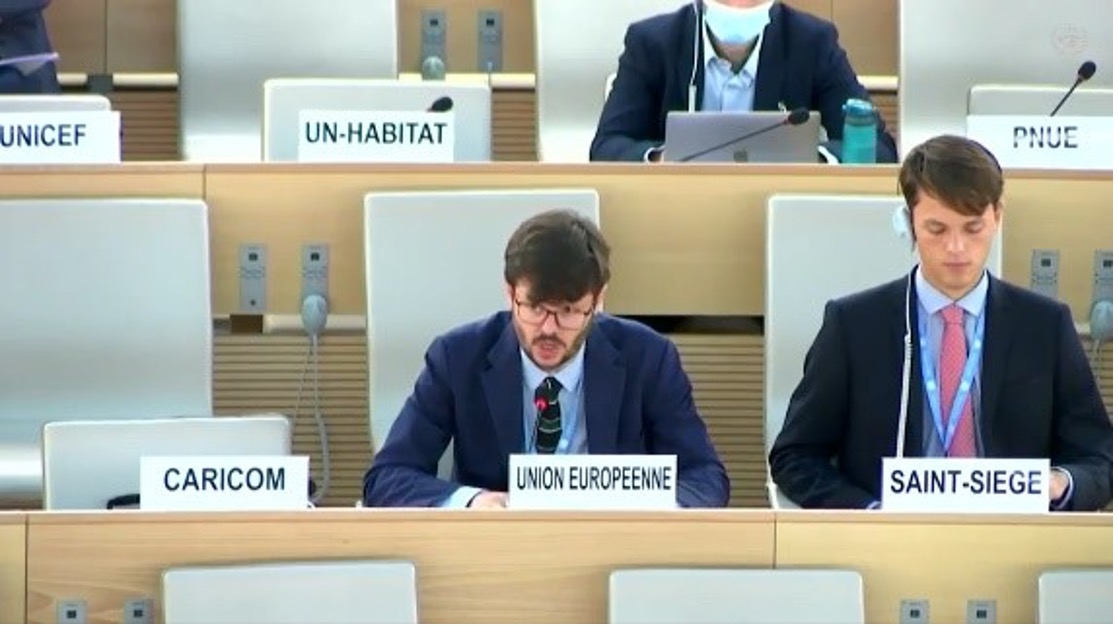
By Farah C. / GICJ
On 24th June 2022, an Interactive Dialogue was held discussing the last report of the Special Rapporteur (SR) on the Human Rights of Migrants.
Border governance trends and especially pushback practices were the central focus of the discussion. This refers to measures that summarily forces back a migrant, without assessing correctly their protection needs. Pushback practices involve the violation of the core principles guiding migration’s governance, such as the principle of non-refoulement or the prohibition of collective expulsion.
The SR’s conclusions were critical: there is a severe increase of migrants’ human rights violations through pushback measures, and an alarming trend of States legalising them.
Moreover, he emphasised the global rise of emergency measures taken by States that are used to justify mass expulsions and other violations at borders.
The Special Rapporteur highlighted some unlawful State practices and some positive progress mostly made by national or regional courts. He recommended States to stop any forced removal and urged States to guarantee a safe place for civil society organisations to carry out their monitoring and rescue missions.
Geneva International Centre for Justice (GICJ) calls all States to abide by the principles laid down in the Global Compact for Safe, Orderly and regular Migration, adopted at the General Assembly in 2018. Border governance necessities should not excuse heartless treatments of individuals crossing international borders and thereby exercising their basic freedom of movement and mobility.
Click here to read the full discussion report.
Reinforcing media freedom and the safety of journalists in the digital age
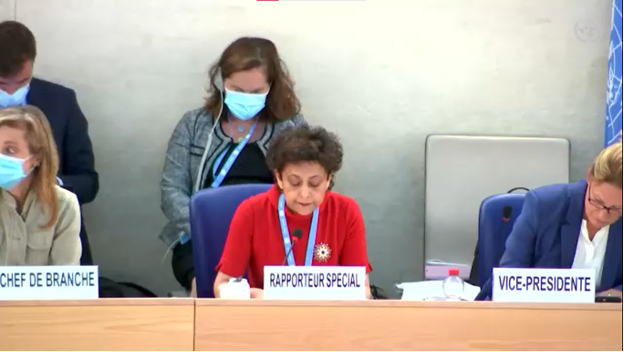
By Hadil Hammami / GICJ
On the 24th of June 2022, the HRC held an Interactive Dialogue with a Special Rapporteur on the promotion and protection of the right to freedom of opinion and expression, Irene Khan, titled: Reinforcing media freedom and the safety of journalists in the digital age.
In her report, the Special Rapporteur, called on the Council to urgently address the long-standing violence and legal harassment endured by female journalists on and off media platforms, with much focus placed on Hungary. Ms. Khan stated that attacks often target women belonging to religious and ethnic minorities or individuals that identify as gender non-conforming. She emphasised that “no woman should trade off her freedom of expression for her right to safety.” The Special Rapporteur expressed her deep concern regarding the prevalence of this issue, claiming that it represents a “severe contemporary threat to journalists' lives”. Furthermore, she noted that this year marked the 10th anniversary of the United Nations Plan of Action on the Safety of Journalists and the Issue of Impunity.
During the meeting, the Special Rapporteur provided specific recommendations to the Council, the international community, and state delegations. She urged all attending representatives to strengthen multi-stakeholder cooperation to promote media freedom and ensure the safety of journalists in today’s digital age.
Geneva International Centre for Justice (GICJ) thanks the Special Rapporteur for her report regarding the protection of journalists and the need to ensure freedom of the press.
GICJ strongly condemns the violence perpetrated against journalists including gender-based violence on and off media platforms, against minorities. We call on the international community to ensure all journalists’ right to freedom of opinion and expression are upheld.
Furthermore, we urge member-states to assure journalists' safety and protection by creating specific international laws that will guarantee the rights and protection of journalists and freedom of the press.
Click here to read the full discussion report.
The right to vote is at risk for millions of internally displaced people around the globe
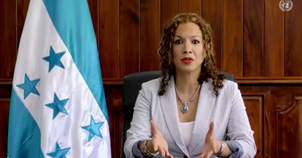
By Danya Al-Thani / GICJ
At the end of her six-year position as Special Rapporteur on the Human Rights of Internally Displaced Persons, Cecilia Jimenez-Damary delivered a report which focuses on the rights of internally displaced persons (IDPs) to vote and stand for public office. She opened the interactive dialogue, which took place at 10am on 28th June 2022 at the 50th Session of the Human Rights Council (HRC).
Ms Jimenez-Damary’s report focussed on her actions since the receipt of her mandate from resolution HRC 41/15. She specifically talked about the importance of the right to partake in elections and to vote, for IDPs, on an equal footing with other citizens. While such participation ensures that IDPs and their needs are considered by politicians, there are currently many barriers that IDP face when exercising their rights to vote. They may not be able to travel home, or register to vote in their host community, and therefore special measures are required to ensure their fair and equal participation. The report uses remote polling stations situated near IDP settlements, as one example of measures that could be implemented by states.
Ms Jimenez-Damary also highlights the importance of recognising that IDPs are not a homogenous group, but rather individuals, often with intersecting needs. The rights of women, children and persons with disabilities, for example, may interact with the accessibility of voting with certain groups, especially ethnic, religious or political minorities finding themselves victims of violence and prejudice when seeking political agency. Women may find themselves isolated from political agency. In her report she emphasises the important role of human rights monitoring, international law and organisations for overcoming these issues.
After Ms Jimenez-Damary introduced her work, states engaged in an interactive dialogue. Unanimously, states and NGOs supported the right of IDPs to vote and called upon the international community to help bring an end to human rights violations against IDPs. Several representatives, including from the USA and the European Union noted that 7 million people have been displaced due to Russia’s military occupation of Ukraine, which they characterised as a crime of aggression. This highlights the importance of peacekeeping activities in reducing the number of people being forcibly displaced globally. The Philippines highlighted the difficulties facing the protection of the rights of IDPs in regions controlled by non-state groups and noted that this was not mentioned in the recommendations of the Special Rapporteur.
Geneva International Centre for Justice (GICJ) is deeply concerned that IDPs face major difficulties in participating in political life and calls upon the international community to monitor the protection of human rights for IDPs. GICJ is also alarmed at the escalation of internal displacement caused by violence and climate change and calls for international cooperation to prevent such occurrences and help afflicted states cope, in order to avoid mass migration events increasing the numbers of the internally displaced.
Click here to read the full discussion report.
Human Rights Situation in Burundi on a Positive Trend
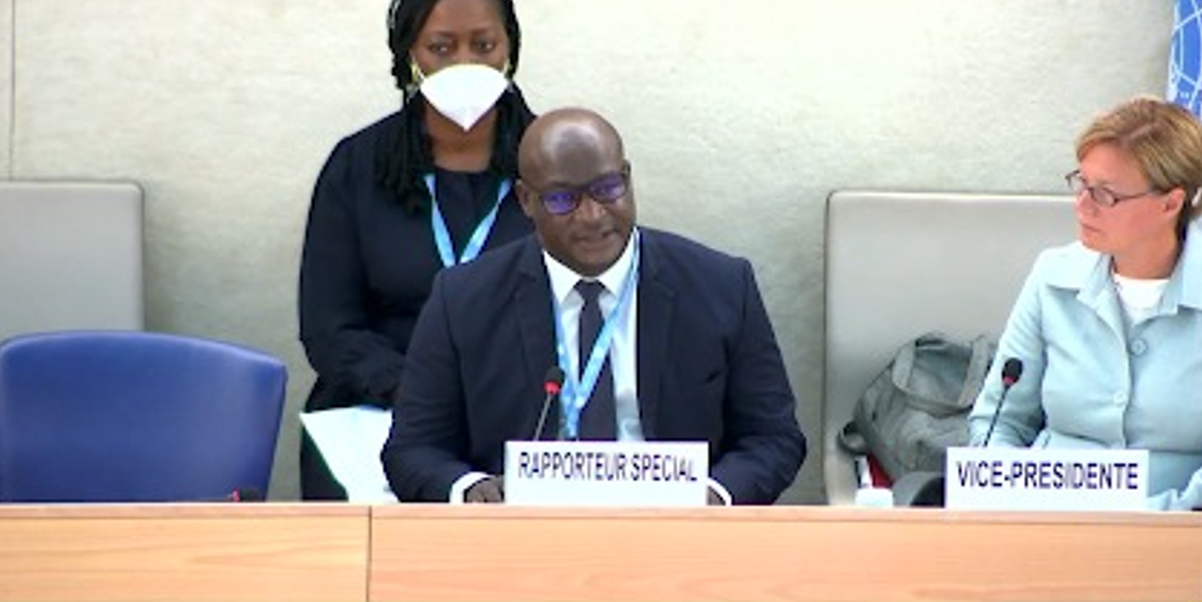
By Patricia Jjuuko / GICJ
On 29th June 2022, the 26th meeting of the 50th Session of the Human Rights Council (HRC) held an Interactive Dialogue with Mr Fortuné Gaetan Zongo, the Special Rapporteur on the situation of human rights in Burundi.
The report gave an update on the current human rights situation in Burundi, recognizing the positive trend of the return of the country to the international scene. This includes the lifting of sanctions by the European Union, the US, and others, as well as Presidential pardons of detained people, and the liberation of journalists and civil society groups. The government of Burundi reaffirmed their intent to promote and protect human rights in compliance with the laws and national regulations in place as well as international instruments which they have ratified.
Geneva International Centre for Justice (GICJ) welcomes the oral update of the Special Rapporteur concerning the human rights situation in Burundi. We remain deeply concerned with the human rights situation especially the killings, disappearances, torture, ill-treatment, arbitrary arrests and detention and sexual and gender-based violence that continue to be documented. The alleged reported violations demand an exhaustive revision of compliance with human rights law and international standards.
Click here to read the full discussion report.
Syria’s 11 Year Humanitarian Tragedy
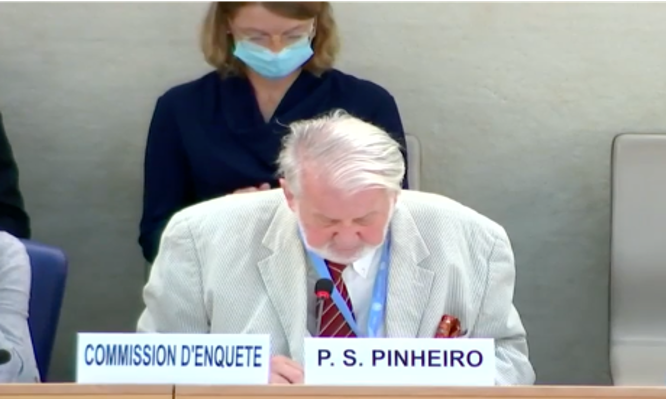
By Sarah Tayara / GICJ
On 29th June 2022 at the 50th Regular Session of the Human Rights Council, the Commission of Inquiry on Syria held an Interactive Dialogue to deliver an oral update on the human rights situation in Syria.
After more than a decade of conflict, the people of Syria can only be said to be living in a humanitarian tragedy. With humanitarian needs at their peak, escalating violence and food insecurity, and the Security Council discussing closing off the last remaining humanitarian aid border, Syrians are staring into an abyss of unimaginable levels of pain and suffering.
More than 12 million people have been displaced from their homes since March 2011. At least 400,000 have been killed. 14.6 million Syrians are dependent on humanitarian assistance. At least 150,000 are arbitrarily detained or forcibly disappeared at any one time, and 90% of the country are living below the poverty line.
Mr Pinheiro discussed the growing levels of arbitrary detentions and enforced disappearances. He explored Bashar Al-Assad’s most recent Legislative Amnesty Decree No. 7 which granted a general amnesty for non-fatal crimes of “terrorism” committed by Syrians before 30th April 2022. Further, he called upon Assad’s government to extend the amnesty to civil and political prisoners.
The Syrian delegate rejected the mandate of the Commission and its report, insisting that it was a platform aimed at shaming the Syrian government and smearing it with unfounded allegations. He reiterated that the Commission’s report contained prefabricated accusations which propagated a politicised agenda against Syria aimed at undermining its territorial integrity. The delegates of Iran and Russia concurred with Syria’s statement and criticised the Commission’s encroachment on Syria’s sovereignty. Other delegations firmly condemned the ongoing violations committed against civilians by the Syrian authorities and other actors involved in the conflict.
Geneva International Centre for Justice (GICJ) welcomes the Commission’s findings and condemns the abuse and suffering that the people of Syria have endured for far too long. Sarah Tayara and Amal Bushara delivered joint statements on behalf of the GICJ and Meezan Center for Human Rights and Association Mao’na for Human Rights and Immigration respectively. Sarah called upon an immediate release of all arbitrarily detained civilians, shedding light on the suffering of a Syrian refugee she met when travelling to Syrian refugee camps in Lebanon. Amal emphasised how victims of enforced disappearances are effectively stripped of all their rights, including the rights to a fair trial and due process of law. GICJ joins the Commission calling upon the Syrian government to immediately release all arbitrarily detained civilians and to issue a wider reaching amnesty for political prisoners.
Click here to read the full discussion report.
Urgent Call for Decisive Actions for Myanmar Crisis
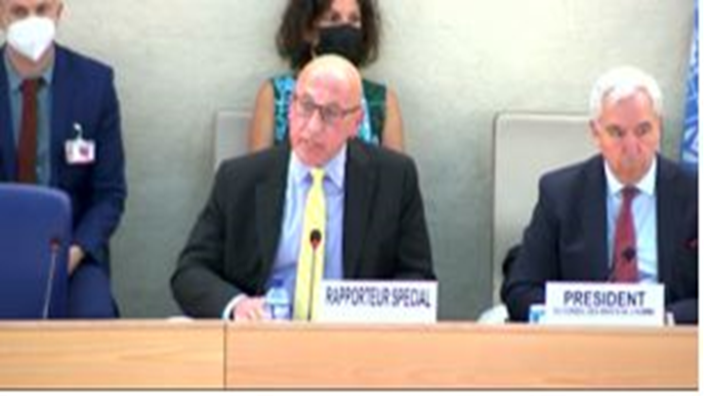
By Ardya Syafhana and Makaela Fehlhaber / GICJ
On the 29th of June 2022, the Special Rapporteur on the Situation of Human Rights in Myanmar (SR), Mr Thomas Andrews, delivered an oral update on the ongoing crisis. Earlier, on the 14th of June, the UN Human Rights Council (UNHRC) heard from the High Commissioner for Human Rights, Ms Michelle Bachelet, regarding the ongoing humanitarian crisis in Myanmar. Mr Andrew’s sentiments largely reflected that of Ms Bachelet, highlighting the attacks on non-combatants since the military coup, the infringement of rights of those arbitrarily detained, and the desire to prosecute perpetrators for their crimes constitutive of genocide, war crimes, and crimes against humanity.
On the Agenda of this meeting, the SR prepared a conference paper concerning military operations targeting children and other grave violations of children’s rights. Hundreds of children in Myanmar died or were maimed during the battle between the Tatmadaw and opposition armed groups; some even became the object of anti-personnel mines and unexploded ordnance. As previously addressed in the UNHRC 49th session, the military junta in Myanmar (Tatmadaw) continued to use arbitrary means to eliminate anyone who opposed its governance. Widespread enforced disappearances and torture also became a daily threat to the people in Myanmar. The paper also revealed that such means had no mercy on children; thousands of whom had been detained, and some tortured to death. The SR recalled the recommendation in its report along with the conference paper at the UNHRC 49th session to draw attention to the cessation of arms transfer to Tatmadaw and its affiliates. Hence, he further invited the International Community to immediately and effectively act on this crisis before Myanmar finally loses its generation.
Mr Andrews opened the discussion by highlighting specific figures that demonstrate the sheer brutality of the conflict. He described grave situations faced by vulnerable persons, including torture and imprisonment, as well as the impact of the conflict for the future restoration of democracy and peace-building within the nation. His call to the countries in attendance was simple: the actions taken had yielded no results, the matter required attention by the United Nations Security Council (UNSC), and a coalition of states should be formed to demonstrate support for the people of Myanmar. In his address, Mr Andrews focused on the harm suffered by children within Myanmar, and the struggles that they will face long-term, should a solution not be implemented immediately. Delegates followed suit and expressed their dismay at the action (or rather the lack thereof) taken to date and encouraged Myanmar’s compliance with the orders of the International Court of Justice (ICJ), along with recommendations of other international bodies. Representatives from Non-Governmental Organisations (NGOs) offered their insight and pressed for global unity on the matter and the need for immediate internal humanitarian assistance.
Geneva International Centre for Justice (GICJ) strongly condemns the military junta’s use of violence against civilians and calls for the UN Member States to pressure them to cease this human rights catastrophe. For the past 17 months, the Tatmadaw has shown no intention to comply with international law, in particular, the law of armed conflict and human rights law. The civilian loss increases every day and children are in the most vulnerable state more than ever. GICJ calls for renewed strategies for humanitarian assistance and greater implementation of international pressure on military authority in Myanmar.
Click here to read the full discussion report
Insincere Strategies in Condemning Racism and Related Intolerances
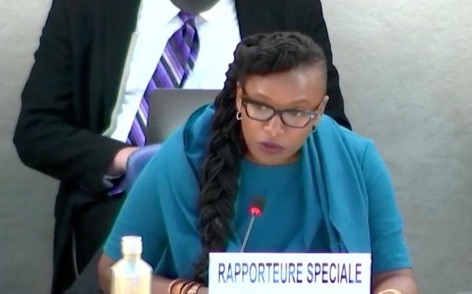
By Jamel Nampijja / GICJ
The Special Rapporteur (SR) on racism, racial discrimination, xenophobia, and related forms of intolerance submitted on the 5th July 2022, two reports during the 50th regular session of the Human Rights Council. The first report explored sustainable development and its relation to racial justice and the international development framework under the 2030 Agenda. The second report explored the alarming growth of racist nationalist and far right political parties and organisations who typically use social platforms like Twitter and Facebook to spread racist ideologies and promote extremist political doctrines.
Additionally, the report analysed racism, racial discrimination, xenophobia, and related intolerance as they manifest through discrimination against persons and groups on the grounds of their race, colour, descent, and national, ethnic origin. The report highlighted two avenues of urgent intervention: critically acknowledging the role of the 2030 Agenda and maximising its emancipatory potential and utilising detailed approaches like the collection of disaggregated data to ensure monitoring and diagnosing of inequality that exists along racial ethnic and national lines.
Further, the report highlighted the effects of the COVID-19 pandemic, that demonstrated the persistence of racial and ethnic hierarchies in all aspects of life. Racially and ethnically marginalised groups were subjected to the worst effects of COVID-19, the wealthiest and the most powerful nations used a form health exclusion described by the SR as “vaccine apartheid”. Additionally, she identified that states also allowed exponential corporate profit while neglecting the means of the ethnically and racially marginalised in the face of soaring energy and food prices.
Geneva International Centre for Justice (GICJ) commends the Special Rapporteur for her work and on an informative report, yet we are appalled by the upsurge of neo-Nazism, right-wing extremism and other hate groups on social media platforms spreading dangerous doctrines, hate speech, and propaganda.
GICJ urges States and social media platforms to implement policies and programmes that combat the increasing racial animosity in the media, including on the Internet as specified in the Durban Declaration and Programme of Action (DDPA). We also encourage States and education institutions to embody the DDPA’s call for the strengthening of human rights education.
GICJ appeals for international cooperation and solidarity in creating inclusive strategies and policies that support vaccine equity for poor nations that have been excluded from COVID-19 treatments.
Click here to read the full discussion report
Russian Authorities accused of Committing Numerous Human Rights Violation Across Ukraine
By Conall Corrigan / GICJ
Despite a lack of access to the area, the Office of the High Commissioner for Human Rights (OHCHR) has confirmed that Russian authorities in Ukraine have been responsible for a range of human rights violations including the use of torture and cruel, inhuman or degrading treatment against civilians, restrictions on freedom of opinion, expression, and peaceful assembly, and limits on the rights of accused persons to a public trial.
During the 35th meeting of the 50th Regular Session of the HRC on the 5th of July, the High Commissioner for Human Rights, provided an oral presentation on the situation in Ukraine and discussed the interim report of the Secretary-General on the human rights situation in Crimea. During her oral update, Ms Bachelet noted that civilians are bearing the brunt of hostilities that seemingly have no end in sight. Despite this, she reiterated the UN’s commitment to monitoring the human rights situation across Ukraine to provide redress for victims.
Most states were eager to denounce Russia’s actions in Ukraine with some asking the High Commission how they can prevent further violations of international humanitarian law (IHL) and international human rights law (IHRL) and ensure accountability for the benefit of victims.
Geneva International Centre for Justice (GICJ) continues to condemn Russia’s actions in Ukraine and urges all parties to the conflict to abide by its obligations under IHL and IHRL. GICJ commends the accountability initiatives already undertaken, most notably by the ICC and the Commission of Inquiry on Ukraine. We appeal for both to be sufficiently funded and resourced to ensure they can fully utilise their investigative powers and provide effective accountability for crimes committed during the conflict. Independent monitoring mechanisms must be granted effective access to all areas of Ukraine in order to adequately assess the damage caused by any and all human rights violations committed across the country. By doing this the international community can provide justice for those who have been forced to endure abuses of their fundamental rights and ensure legal avenues for redress.
Click here to read the full discussion report
Improving Human Rights statistics in the Central African Republic
By Amie Sillito / GICJ
The United Nations Human Rights Council extended its mandate in the Central African Republic (CAR) regarding the human rights abuses and the current political instability in the country. The Independent Expert commended the CAR government on progress made in the country since his last report on tackling impunity and ensuring redress for victims of human rights violations.
The current threat against humanitarian aid workers was discussed as well as the lack of action taken against the illegal arms trade in the country following the arms embargo. The presence of international mercenary groups was also highlighted during the Interactive Dialogue and the government was encouraged to expel all actors who did not conform to the ceasefire or respect human rights and humanitarian law. The responses of most delegates were positive and numerous representatives confirmed that they would continue to support the CAR government and its efforts as well as the Expert’s work. It was suggested that the CAR should find an African solution to its African based problems instead of implementing international solutions to its domestic affairs.
Geneva International Centre for Justice (GICJ) commends the Council for extending its mandate on the CAR. We encourage the CAR government to expel illegal mercenaries in the country and invest its resources into the prevention of the illegal arms trade. GICJ remains concerned over the alleged human rights violations committed at the hands of the national army, including extrajudicial executions of suspected CPC members, attacking civilians, occupying government buildings, and looting private property. Attacks on humanitarian workers by armed groups and unidentified persons is extremely worrying. It is imperative that the government secures its political hold over the country to facilitate the proper functioning of humanitarian aid facilities.
According to the UN Food and Agriculture Organisation, the number of people facing acute food insecurity increased from 1.9 million to 2.29 million in 2021. UNICEF has also indicated that over 40% of children under the age of five were already chronically malnourished. Therefore, it is paramount that humanitarian aid is given safe access to the country and protected whilst performing their duties. Due to the current deficit in the number of qualified medical personnel and essential medicines available within the CAR, we urge the international community to donate medical supplies to resolve this crisis. Following the COVID-19 pandemic the country would also benefit from vaccine support as the majority of its population remains unvaccinated.
Click here to read the full discussion report
Alleged Breaches and Abuses of International Human Rights and Humanitarian Law in Libya
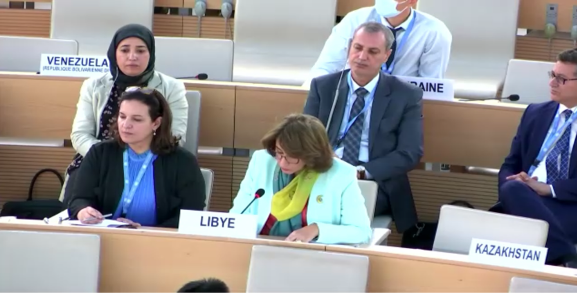
By Yasmine Titouni/ GICJ
During an Interactive Dialogue at the 50th Human Rights Council (HRC) session on 6th July 2022, Mr Mohamed Auajjar, Chair of the fact-finding Mission (FFM) on Libya, presented his preliminary findings and engaged with various member-states who expressed their opinions on the human rights situation in Libya. The leader of the FFM in Libya emphasised, among other things, systematic violations, and abuses of human rights against men, women, children, internal and external migrants, and inmates in official and unofficial detention facilities. Many delegations praised the work of the fact-finding team and thanked the Libyan government for its cooperation and collaborative efforts with the international community during the interactive session.
After hearing the statements of several delegations, Mr Mohamed Auajja, head of the fact-finding Mission addressed the diverse concerns raised by countries. He was appreciative of the participants' articulation of obstacles and limiting issues concerning n interventions. Ms Robinson, one of the members of the FFM stated that it exceeded expectations of what she and her colleagues thought they would be able to achieve. She further added that the cooperation of Libyan authorities was crucial to the reform and growth of Libyan institutions. The proposed creation of a special tribunal for the atrocities committed in Tahuna was outlined and discussed. As the report gathers evidence of kidnappings, murder, and torture in Tarhuna, this tragic episode, constitutes one of the most egregious instances of human rights violations since Muammar Gaddafi's overthrow in 2011. Emanating from a universal consensus, it was urged that those responsible for perpetrating crimes in Tahuna must be held accountable by a reformed judicial system. The FFM offered the first suggestions for the formation of a special tribunal inside the Libyan legal system. In addition, the Mission called on the international community to increase its coordination with the Libyan government by committing to prompt action, steadfast support of the democratic transition and promotion of democratic elections in Libya. Since 2016, the armed conflict in Libya has been the focal point of the FFM’s comprehensive report. The panellists participating in the Interactive Dialogue identified violations of international humanitarian law including direct attacks on civilians, sexual violence, enforced disappearances, and displacement. They further concluded that since 2016, the rights of Libyan women and children as well as cases of arbitrary detention, continue to be neglect
Geneva International Centre for Justice (GICJ) urges immediate action to educate Libyans about their right to justice and to receive compensation. The international community and the Libyan government must work together to combat sexual and gender-based violence by "removing legal and institutional barriers that prevent its reporting." Providing victims with access to rehabilitation programmes and justice, publicly denouncing all types of gender-based violence, and holding offenders accountable should be among the steps taken to address these issues.
The 50th Session of the Human Rights Council covered many key topics relating to human rights. Together with partner organisations, GICJ successfully participated in the session by delivering a total of 10 oral statements and 20 discussion reports.
Altogether, GICJ contributed to shedding light to several human rights issues by addressing numerous forms of violence and degrading or inhumane treatment, emphasising the importance of an independent judicial system, reiterating the key principles of fairness and non-discrimination, advocating for the respect of the rule of law, promoting intercultural awareness, and fighting impunity. The crisis in Ukraine, the stagnation in the Rohingya crisis in Myanmar, the prevalence of structural violence against women and the after-effects of the Covid-19 pandemic were some of the key discussions taken up by the Council.
Such discussions necessitate the need for politically feasible solutions to ensure the attainment of human rights. GICJ reiterates the need for all member-states to ensure commitment to said attainment.




